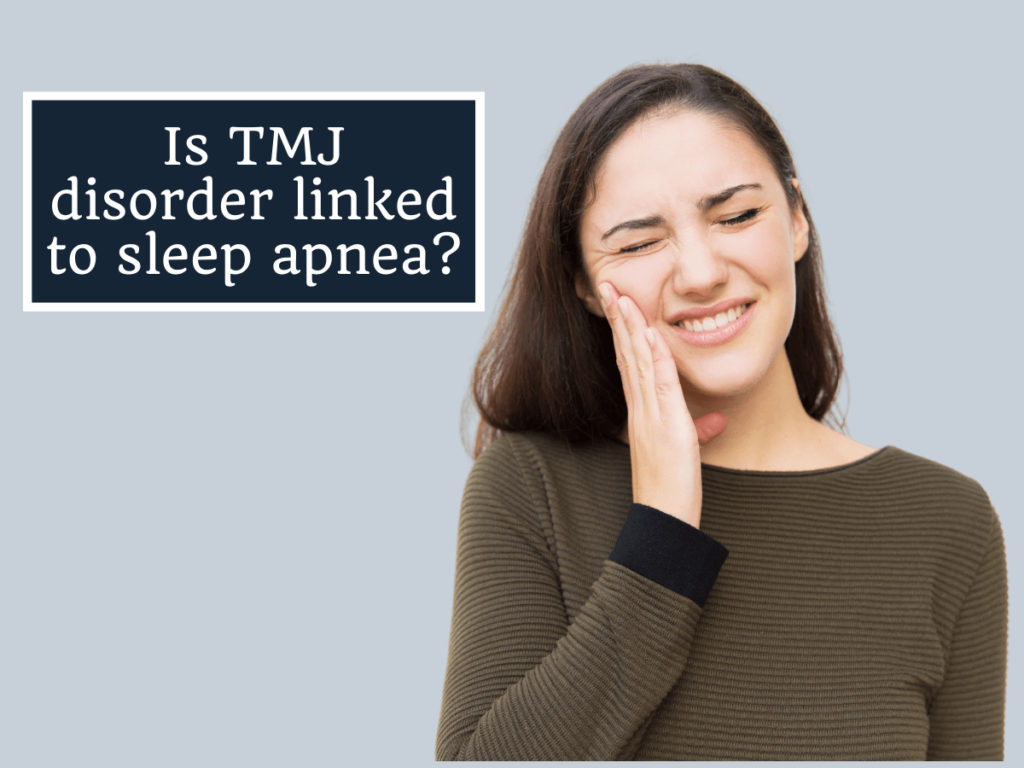
Are you feeling tired throughout the day? Or have trouble sleeping through the night? Well, you’re not alone, as the American Sleep Apnea Association estimates that roughly 22 million Americans have sleep apnea? And, most surprising of all is that 80% of moderate to severe cases are undiagnosed as they are not aware.
While sleep apnea is a disorder that causes many health problems, it can also be connected to other conditions, such as Temporomandibular joint dysfunction (TMJ Disorder). If you’re experiencing sleep apnea and TMJ disorder symptoms, continue to read to see how they are linked and how you may benefit from TMJ treatment to improve your quality of life.
Those who suffer from sleep apnea often have trouble sleeping because they have an obstructed airway which interrupts their breathing patterns.
The most common type of sleep apnea is obstructive sleep apnea (OSA), caused by limited airway while sleeping. In order to get enough oxygen while sleeping, our body automatically pushes our jaws forward to open up the airway to allow more oxygen. If OSA is left untreated and depending on the severity of it, sleep apnea sufferers may experience:
Because of the constant stress of the jaw being pushed forward to open up the airway, it can lead to clenching and grinding of the teeth. This will not only lead to a negative effect on the jaw joints as they become inflamed, but it can also contribute to temporomandibular joint disorder (TMD), causing your joint, sleep apnea, and overall health to worsen.
When your brain realizes that it’s been deprived of oxygen, it sends a message to the heart, asking it to pump faster and harder. Your body will also automatically contract and clench the jaw muscles to open up the airway. This repetitive clenching movement causes nighttime bruxism and can contribute to tooth wear, jaw joint damage, and other dental problems.
Do you wake up with a migraine or headache every single morning? This is far from ordinary and usually indicates something more going on. If you have sleep apnea and are experiencing the following TMJ symptoms, visit a dentist who can treat your sleep apnea and TMJ symptoms.
The good news is that no matter your level of discomfort, there are many treatment options available to help ease your sleep apnea and TMJ symptoms. While some instances of TMJ disorders may resolve on their own, there’s no reason to wait to take action on treating your TMJ issue. For patients suffering from sleep apnea, it’s a chronic disorder where symptoms can range from mild to severe, and will not go away on it’s own. Untreated, sleep apnea may lead to serious health complications, including heart problems. When you see a general dentist who has experience diagnosing and treating sleep apnea and TMD, here are some possible options for treatment.
At Sloan Creek Dental, we offer the most effective treatment for obstructive sleep apnea and temporomandibular joint disorder. After undergoing a sleep study, effective treatment can begin. The most common and effective form of therapy involves using an oral appliance, a custom-made device similar to a mouth guard. The oral appliance fits over the teeth and is worn at night to reposition the jaw to it’s natural position. When the oral appliance is used to treat sleep apnea, repositioning the jaw forward will also bring the tongue forward, which helps keep the airway open.
The first step in treating sleep apnea is to conduct a home sleep study. The study measures oxygen levels, heart rate, and brain activity. By completing the sleep study at home, your doctor will be able to collect the necessary data for a proper diagnosis. After a medical physician has properly diagnosed you, Dr. Feng will discuss your treatment options and will help you determine the best treatment plan based on your overall health and needs.
Using a CPAP mask can cause pain and discomfort for many people with sleep apnea. Due to its pressure, the CPAP mask can cause the jaw to move back and compress the lower face. Research has shown that extended use of a CPAP mask can cause physical changes in the jaw, neck pain, and jaw pain, leading to TMJ symptoms.
Did you know that your mouth’s health is closely connected to your sleep patterns and jaw function? Because of that, an experienced dental professional can determine whether a sleep disorder, a bite issue, or a more serious health issue is causing you pain.
If the jaw pain is related to an underlying sleep disorder, treating the OSA should help resolve your symptoms. Without this added burden, your body won’t trigger the clenching of your teeth and your temporomandibular joint.
An oral appliance can be used as a non-invasive treatment for TMJ. The appliances’ unique features and technology help relieve pressure and tension in the temporomandibular joint. Get a more restful sleep at night with an oral appliance to protect your health, getting rid of your headaches and jaw pain.
If you have any questions, want to learn more about how Dr. Feng in Fairview can treat sleep apnea and TMJ, or to schedule an appointment at our office, please get in touch with our dental office at 972-468-1440, or leave us a message.
Our dental office is located in Fairview, Texas, and our patients visit us from across the surrounding areas, including Allen, Plano, McKinney, and Lucas.

We firmly believe that the internet should be available and accessible to anyone, and are committed to providing a website that is accessible to the widest possible audience, regardless of circumstance and ability.
To fulfill this, we aim to adhere as strictly as possible to the World Wide Web Consortium’s (W3C) Web Content Accessibility Guidelines 2.1 (WCAG 2.1) at the AA level. These guidelines explain how to make web content accessible to people with a wide array of disabilities. Complying with those guidelines helps us ensure that the website is accessible to all people: blind people, people with motor impairments, visual impairment, cognitive disabilities, and more.
This website utilizes various technologies that are meant to make it as accessible as possible at all times. We utilize an accessibility interface that allows persons with specific disabilities to adjust the website’s UI (user interface) and design it to their personal needs.
Additionally, the website utilizes an AI-based application that runs in the background and optimizes its accessibility level constantly. This application remediates the website’s HTML, adapts Its functionality and behavior for screen-readers used by the blind users, and for keyboard functions used by individuals with motor impairments.
If you’ve found a malfunction or have ideas for improvement, we’ll be happy to hear from you. You can reach out to the website’s operators by using the following email
Our website implements the ARIA attributes (Accessible Rich Internet Applications) technique, alongside various different behavioral changes, to ensure blind users visiting with screen-readers are able to read, comprehend, and enjoy the website’s functions. As soon as a user with a screen-reader enters your site, they immediately receive a prompt to enter the Screen-Reader Profile so they can browse and operate your site effectively. Here’s how our website covers some of the most important screen-reader requirements, alongside console screenshots of code examples:
Screen-reader optimization: we run a background process that learns the website’s components from top to bottom, to ensure ongoing compliance even when updating the website. In this process, we provide screen-readers with meaningful data using the ARIA set of attributes. For example, we provide accurate form labels; descriptions for actionable icons (social media icons, search icons, cart icons, etc.); validation guidance for form inputs; element roles such as buttons, menus, modal dialogues (popups), and others. Additionally, the background process scans all of the website’s images and provides an accurate and meaningful image-object-recognition-based description as an ALT (alternate text) tag for images that are not described. It will also extract texts that are embedded within the image, using an OCR (optical character recognition) technology. To turn on screen-reader adjustments at any time, users need only to press the Alt+1 keyboard combination. Screen-reader users also get automatic announcements to turn the Screen-reader mode on as soon as they enter the website.
These adjustments are compatible with all popular screen readers, including JAWS and NVDA.
Keyboard navigation optimization: The background process also adjusts the website’s HTML, and adds various behaviors using JavaScript code to make the website operable by the keyboard. This includes the ability to navigate the website using the Tab and Shift+Tab keys, operate dropdowns with the arrow keys, close them with Esc, trigger buttons and links using the Enter key, navigate between radio and checkbox elements using the arrow keys, and fill them in with the Spacebar or Enter key.Additionally, keyboard users will find quick-navigation and content-skip menus, available at any time by clicking Alt+1, or as the first elements of the site while navigating with the keyboard. The background process also handles triggered popups by moving the keyboard focus towards them as soon as they appear, and not allow the focus drift outside of it.
Users can also use shortcuts such as “M” (menus), “H” (headings), “F” (forms), “B” (buttons), and “G” (graphics) to jump to specific elements.
We aim to support the widest array of browsers and assistive technologies as possible, so our users can choose the best fitting tools for them, with as few limitations as possible. Therefore, we have worked very hard to be able to support all major systems that comprise over 95% of the user market share including Google Chrome, Mozilla Firefox, Apple Safari, Opera and Microsoft Edge, JAWS and NVDA (screen readers), both for Windows and for MAC users.
Despite our very best efforts to allow anybody to adjust the website to their needs, there may still be pages or sections that are not fully accessible, are in the process of becoming accessible, or are lacking an adequate technological solution to make them accessible. Still, we are continually improving our accessibility, adding, updating and improving its options and features, and developing and adopting new technologies. All this is meant to reach the optimal level of accessibility, following technological advancements. For any assistance, please reach out to